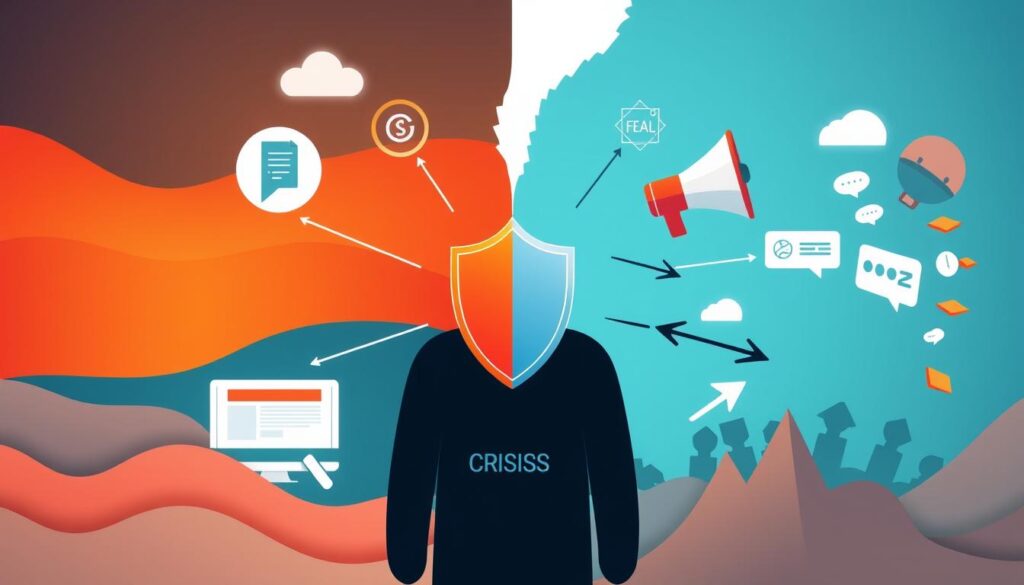In today’s digital world, a single customer review can greatly affect your brand’s reputation during a crisis. This is a big concern for businesses dealing with public opinion. We’ll look at how responding to reviews is key in crisis management and helps protect your brand’s image.
Crisis management is vital for keeping your business running and keeping customers trusting you. When a crisis happens, your brand’s reputation can drop a lot. But, good crisis management can lessen risks, improve customer relationships, and make your company stand out1.
During a crisis, the stakes are very high. Most consumers, 79%, expect companies to reply to all reviews, both good and bad, showing they care about feedback. This is especially true during a crisis2.
Talking to customers when things are tough is not just polite—it’s smart. Brands that talk to customers during a crisis see a 23% increase in positive feelings towards them. This interaction can help your brand recover faster and build stronger loyalty2.
Let’s see how we can use review responses to protect and even boost our brand’s reputation when times are tough.
Key Takeaways
- Effective crisis management is key for brand reputation and customer trust
- Answering reviews shows customers their opinions matter
- Being active in crises can boost positive feelings towards your brand
- Quick and clear responses are vital for how the public sees you
- Crisis management strategies can help quickly regain customer trust
Understanding the Impact of Reviews During a Crisis
In today’s digital world, what customers say online is key to a company’s image. When a crisis hits, this becomes even more true. Reviews can either save or ruin a brand’s reputation during tough times.
Reviews greatly affect what people choose to buy. A huge 82% of people look to social networks for advice on what to buy3. And 77% of shoppers check out reviews before visiting local businesses3.
Bad reviews can really hurt a company’s image. More than half of businesses see their reputation and trust drop after a crisis4. This can lead to losing up to 30% of customers if not handled well4.
Answering to reviews is key in handling a crisis. It shows you care about what customers say and can lessen damage. Being open in crisis communication helps customers make better choices4. A quick, effective reply can improve how customers see you and build trust4.
| Review Impact | Percentage |
|---|---|
| Trust in social networks for purchase decisions | 82% |
| Consumers reading online reviews regularly | 77% |
| Consumers looking for negative reviews | 96% |
It’s interesting that 96% of consumers often look for negative reviews3. This shows how important it is to quickly and professionally address bad feedback. By doing this, companies can turn crises into chances to get better and show they care about customer happiness.
Principles of Effective Crisis Management
Effective crisis management relies on key principles. These guide organizations through tough times. Being open and quick to respond is key. We keep our stakeholders updated to build trust5.
We focus on being prepared. We make detailed plans, check risks, and train our team. This way, we can quickly spot and tackle crises with flexibility6.

Talking to stakeholders is vital in a crisis. We use many ways to communicate well with our audience. Being kind and working together with customers is important to us. We make sure to reach out personally to those affected5.
“Crisis doesn’t create character; it reveals it.”
Leadership is key in managing a crisis. Our top people lead the way, giving clear guidance and reassurance. They show they can solve problems well, making it clear to everyone6.
| Crisis Management Principle | Key Action |
|---|---|
| Transparency | Open communication |
| Responsiveness | Swift problem-solving |
| Preparation | Comprehensive planning |
| Stakeholder Engagement | Multi-channel outreach |
| Leadership Visibility | Clear direction from senior figures |
Now, crisis management is more team-based and dynamic. We follow global standards for before, during, and after a crisis. This makes us ready, quick to respond, and always improving our methods7.
Strategies for Responding to Reviews During a Crisis
In today’s digital world, handling reviews well is key for keeping a good online image. When a crisis hits, it’s even more important. A big 59% of businesses have faced a crisis, but only 54% had a plan ready8. This means many are not ready for the tough times of crisis communication.
Being quick to respond during a crisis is crucial. Fast replies help ease customer worries and keep trust. It’s important to say sorry when needed and stay calm9. A single bad review can lose a company 22% of potential customers8.

Being professional in customer service is very important. Keep answers short and stick to the facts, not feelings. It’s good to answer publicly but take deeper talks offline. This shows you’re open but keeps private info safe.
Using social media is key in a crisis. Sites like Twitter let you share updates fast, keeping customers in the loop9. For important people, like customers and partners, talking directly by email or phone can help keep trust strong.
“In a crisis, be aware of the danger – but recognize the opportunity.” – John F. Kennedy
Handling a crisis well needs a solid plan. A team with different roles can work better together. This team should have clear leaders and a plan for who does what10.
| Crisis Level | Typical Scenarios | Required Action |
|---|---|---|
| Level 1 | Product recalls, workplace harassment | Swift, planned response (73% of cases)10 |
| Level 2 | Customer complaints | Immediate address to prevent escalation (82% of cases)10 |
| Level 3 | Competitor or industry-related issues | Competitive intelligence (67% of cases)10 |
By using these strategies, businesses can handle crises better, keep their brand safe, and turn problems into chances for growth and loyalty.
Crisis Management: Best Practices for Review Response
In today’s digital world, what customers say about your brand matters a lot. When a crisis hits, how you respond to reviews is key to keeping customers happy and protecting your brand. Here are some top tips for handling a crisis.

Start by setting up a crisis team with people from different departments. They should be ready to tackle various crisis aspects. Make sure they’re trained and tested to see how well your plan works11.
Here are the main steps to follow when responding to reviews in a crisis:
- Apologize sincerely and acknowledge the customer’s experience
- Offer to make things right
- Provide contact information for further discussion
- Keep responses brief, professional, and focused on resolution
Using crisis response templates can help, but make each response personal. This shows you’re really listening to customers and not just sending out automated messages. Remember, good crisis communication is a science that needs a clear plan and specific messages for different people12.
Having strong communication lines inside and outside your company is crucial in a crisis. This lets your team answer quickly and consistently on all platforms11. This way, you can turn negative feedback into chances to show you care about customer satisfaction and quality service.
| Key Element | Importance | Action Item |
|---|---|---|
| Dedicated Team | High | Assemble cross-departmental experts |
| Response Templates | Medium | Create and personalize |
| Communication Channels | High | Establish and maintain |
| Regular Training | High | Conduct drills and updates |
By following these best practices, you’ll be ready to handle customer feedback in a crisis. This will protect your brand and build loyalty through smart reputation marketing.
Conclusion
We’ve looked into how crisis management keeps a brand’s reputation safe and keeps customers trusting. It started in the 1980s with big industrial and environmental disasters. Now, it’s key in public relations13. Knowing how reviews affect a brand in a crisis helps us get ready for surprises.
Good crisis management means tackling threats before, during, and after they happen. It’s about quick responses, clear talks, and knowing when to stop a crisis13. We use strategies like being open, quick to respond, and engaging with customers to get through tough times.
Handling a crisis means understanding its effects, stopping crises before they start, and setting rules for ending them13. By doing this, companies can get better at facing crises and keep going. This helps in keeping customers and managing the brand’s image.
After a crisis, it’s important to review how we handled it to see what worked and what didn’t14. By always checking and improving our crisis plans, we can protect our brand better and be ready for what comes next.
FAQ
Why is crisis management important for businesses?
How do online reviews impact a company’s reputation during a crisis?
What are the key principles of effective crisis management?
What strategies should companies use when responding to reviews during a crisis?
What are the best practices for review response during a crisis?
Why is effective crisis management and review response crucial for businesses?
Source Links
- Brand Reputation Crisis Management – https://www.cision.com/resources/insights/brand-reputation-crisis-management/
- Navigating Crisis Management: Protecting Your Brand in the Digital Age – https://zempmedia.medium.com/navigating-crisis-management-protecting-your-brand-in-the-digital-age-30ef57ad5d52
- How to Prepare for and Manage a Crisis – https://www.brandwatch.com/blog/crisis-management/
- Crisis Management in Customer Relationships: Building Trust in Times of Trouble – https://www.earlyalert.com/customer-relationships-through-effective-crisis-management/
- StratCom – https://comartsci.msu.edu/sites/default/files/StratCom/Files/StratCom_Effective Crisis Comm.pdf
- The five key principles of effective crisis management and communication – a blog by Jonathan – https://fcmpr.co.uk/fcm-news/the-five-key-principles-of-effective-crisis-management-and-communication-by-jonathan/
- What are the Three Stages of Crisis Management? – https://www.internationalsos.com/magazine/what-are-the-three-stages-of-crisis-management
- Crisis Management Plans and Strategies for Businesses – https://onlinemba.wsu.edu/blog/crisis-management-plans
- How to manage customer satisfaction in a crisis – https://www.zendesk.com/blog/how-to-manage-customer-satisfaction-crisis/
- 11 Steps for PR Crisis Management – Talkwalker – https://www.talkwalker.com/blog/pr-crisis-management
- Crisis Management: Key Components & Best Practices | Jaro Education – https://www.jaroeducation.com/blog/crisis-management-key-components-and-best-practices/
- Implement Crisis Management Best Practices – https://www.infotech.com/research/ss/implement-crisis-management-best-practices
- Crisis management – https://en.wikipedia.org/wiki/Crisis_management
- Crisis Management in Projects: How to Handle Challenges – https://hive.com/blog/crisis-management-in-project-management/

